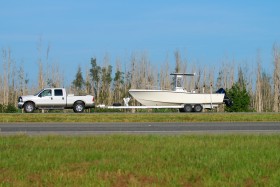Boat Towing Safety Tips

When you own a boat, there’s inevitably going to be a time when it needs to be moved from one location to another. Maybe it’s been in storage for the winter and it’s time to get back on the water, or you just want to take your boat out on different lakes around the state. When that time comes, many boat owners choose to tow their boats themselves between locations.
Many boats can be towed, but it’s extremely important to make sure they’re being towed safely. Otherwise, it’s extremely easy for accidents to happen. Towing a boat can create challenges that you don’t experience when driving your vehicle for everyday purposes, like needing more time to accelerate, needing to make wider turns, not being able to stop as quickly as you normally would. Then there are problems that can be caused by trying to tow a boat without the right equipment. Here are some tips to help make sure your boat is towed safely.
Practice
Since attaching a trailer and a boat to a vehicle can affect the way it handles, it’s a very good idea taking some time to get used to maneuvering your vehicle before hitting the road. This is especially true if you’ve never tried towing a boat before or you’ve gotten a new vehicle since you last towed a boat. Just like you did when you were first learning to drive, spend some time in an empty parking lot with your boat and trailer attached and get used to doing things like making turns, braking, and maneuvering while in reverse.
The Right Towing Gear
Making sure you have the appropriate towing gear for your boat is essential for safety. Before you begin towing a boat, make sure your vehicle and trailer are capable of towing it. Check your Gross Vehicle Weight Rating (GVWR) and Gross Trailer Weight (GTW) to find out how much weight your car and trailer are capable of towing. It’s recommended to not exceed 80% of the GVWR and GTW. If you do, it can lead to problems like the boat tipping over or the hitch breaking. Don’t forget to factor in other things that can add weight to the vehicle, like passengers and other things you might be bringing with you, like fuel and equipment.
You’ll also want to make sure the tongue weight is correct. Otherwise, it could be more difficult than it needs to be to drive with the boat.
Secure Loose Items
If loose items fall off of a vehicle in motion, it can be extremely dangerous for other vehicles on the road. Before you start driving, make sure any loose items in the boat are secured so that they won’t fall onto other vehicles or onto the road, causing other drivers to stop or swerve.
Find Your Balance
When loading a boat onto a trailer, make sure it’s centered on the trailer. Anything else that will be on the trailer, like fuel, should also be distributed evenly to keep the weight evenly balanced. If the weight isn’t distributed evenly, the more difficult it will be to maneuver the trailer.
Inspect the Trailer
It’s a very good idea to routinely inspect your trailer to make sure everything is still in good working order. Check to make sure the trailer’s turn signals and brake lights are functional, tires are properly inflated, and you don’t see other signs of damage or wear and tear, like rusty axles. All of those things can potentially lead to an accident if they aren’t addressed.
Contact a Car Accident Lawyer
Even good drivers can become car accident victims. When other people are negligent when doing things like towing boats or trailers, it’s easy for someone to get hurt. If you’ve been injured in any kind of car accident, don’t hesitate to contact a car accident lawyer. When you call Goodwin & Scieszka, you’ll be able to speak to a lawyer experienced in a wide range of motor vehicle accident cases in the state of Michigan. Contact us today to get help with your case.
Image: iStock / icholakov






